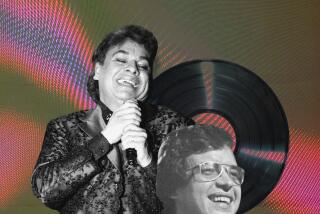Landmark Salsa From Fania Stars
- Share via
FANIA ALL STARS WITH HECTOR LAVOE *** 1/2
“Fania All Stars With Hector Lavoe”
Sony Discos
Until recently, the classic recordings from Fania Records, the citadel of salsa music, were cruelly unavailable to salsa lovers in the United States. But a recent agreement with Sony Music means that these landmark albums will finally be coming our way on CD.
Spanning the most creative years in salsa--the ‘70s and early ‘80s--Fania is that rare phenomenon in popular music: a label--like Sun Records with rockabilly in the ‘50s--that virtually created a genre and boasted every one of its superstars. Both Tito Puente and Celia Cruz spent a good amount of time there. So did Latin jazz pioneers Eddie Palmieri and Ray Barretto. And the three people responsible for the most brilliant salsa ever--Ruben Blades, Willie Colon and Hector Lavoe--were all discovered by New York-based Fania.
Lavoe is the subject of the first in a series of six releases that launches the new Fania-Sony re-release program. The tracks are culled not from the Nuyorican singer’s own solo albums but from his two decades’ worth of collaborations with the groundbreaking Fania All Stars, the label’s own combo of virtuosos. At times the group included Larry Harlow on piano, Yomo Toro on cuatro (a small guitar-like instrument), Ray Barretto on congas and Orestes Vilato on timbales.
It was a dynamite group that blended big-band jazz and Latin beats with tremendous ease, enjoying both spicy group interplay and solo improvisation.
Although it’s a joy to have this music available again, Lavoe and his fans deserve more respect from the record company.
For starters, why not celebrate the CD release of this and the other Fania collections with the same digital remastering that is routinely done for other classic recordings? The music sounds flat and a little hollow--far less striking than in its original vinyl form. A bit of care and money could have brought a tremendous improvement. At a time when people mistakenly think that salsa was bred in Cuba rather than in New York, these musical archives are of great historical importance.
The other releases in the series--devoted to Blades, Cruz and other artists--lose even more points for sound, lackluster artwork and skimpy liner notes that don’t even list the musicians on the sessions.
It’s a tribute to the legacy of the late Lavoe that his album almost merits four stars even with its technical shortcomings.
More to Read
The biggest entertainment stories
Get our big stories about Hollywood, film, television, music, arts, culture and more right in your inbox as soon as they publish.
You may occasionally receive promotional content from the Los Angeles Times.










